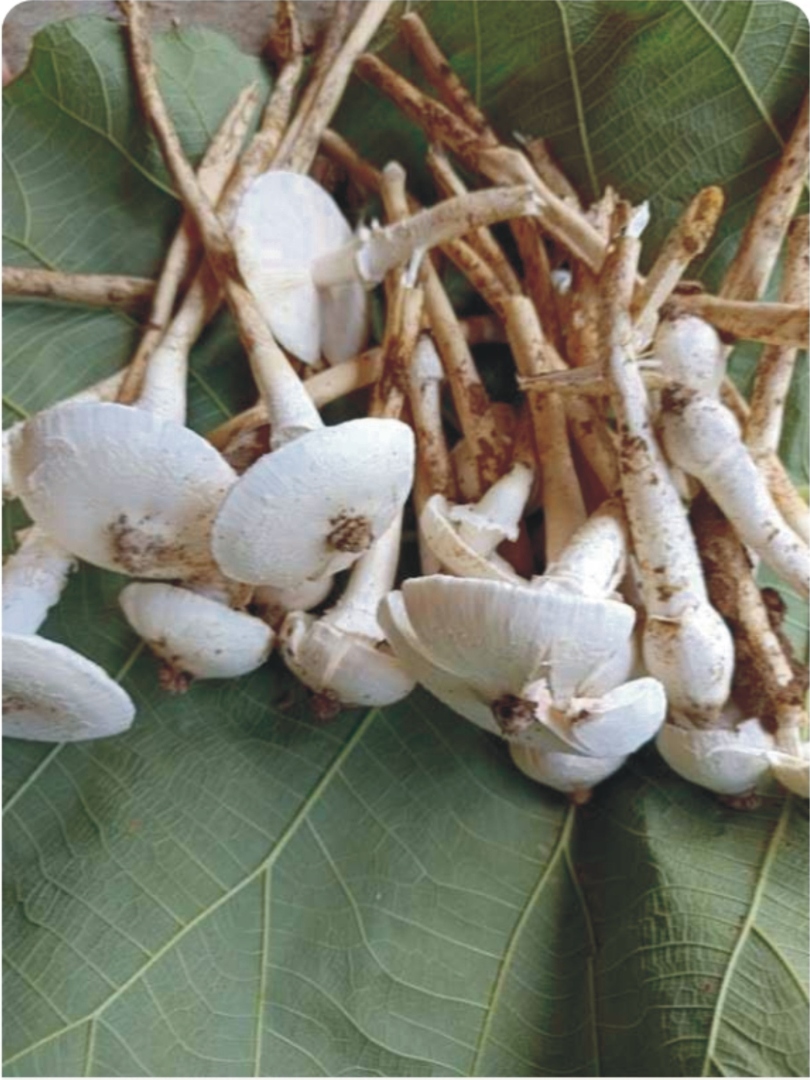
Popularly coined as ‘Royinichi Almi’ by the locals, it is an anthill mushroom that sprouts with the onset of heavy monsoon along the forest belt of western ghats as well as villages where one can find clay type muddy soil along the bunds and in forest zones.
It commands a heavy price due to its taste and emergence only in July-August when the locals venture into forest bound areas to pick them up before someone else picks them up. Sometimes they don’t bother for the mushroom to grow big and pluck them up before time, and sell by placing them on large leaves found in the vicinity.
There are locals who avoid going to their regular job during these days because they know exactly the terrain, area of availability and topography where the mushrooms sprout from underneath the ground. These mushrooms are removed by pulling its inner stalk. These fetch good income if sold on the road side on highways. People, who travel by, pull aside their vehicles to stop and buy them at whatever price quoted due to their non-availability throughout the year. It is one of the most sought after delicacy during monsoons.
I recollect my time at Kalay farm when I used to travel by railway from Vasco da Gama to Kale station. I used to get requests from friends and family to get this variety of mushrooms directly from the source. I used to request my staff to approach the dwellers in higher terrain and the hilly side of the mountains who were well-versed in plucking mushrooms and bring down in sack full. These were sold in the market to general public, at high price. Accordingly my staff would keep a vigil on the hilly track from where the shepherds walked down the slope with their precious booty of sack full of mushrooms. Each of the packets had 50 or 100 pieces depending upon the size.
My staff would see them and intercept as they descended on the slope, ask to handover the bagful of mushrooms, offering them amount for the entire quantity. They used to succeed in striking a good bargain due to their proximity to the locals and deal in the local language. I used to please my fellow train companions with few packets of fully grown robust size mushrooms, keeping the rest for my family. We used to sort out and repack them in various packets depending on their sizes and whether they were open or closed. These packets would go in the fridge for using later. If stored in the fridge without removing the soil in which they grew, they don’t spoil and the taste remains intact.
I remember an incident at Dharbandora, where the locals who harvested them sold to earn their living. Some authorities used to keep an eye on them and without paying the due remuneration would snatch away the mushroom packets. Sharing their woes with a duty bounded upright officer working in their jurisdiction they complained that they were deprived of their hard earned money due to these scrupulous authorities.
The said officer advised them to do a trick, put unwanted material in the package and allow some well grown mushrooms to be seen popping out of the packets. The locals did this trick. When they were caught with their forest mushrooms and the authorities asked them to handover their packets, they did so. The trick worked. When the packets were taken home and opened they got fooled. Their families lambasted them for bringing spoiled packets without opening them or seeing their contents, and as the message conveyed to them was loud and clear, they stopped doing it forever – Never cheat or rob a hard working person selling forest produce on the roadside as he works overtime to give a little more to his family than his regular monthly income.
(The writer is a retired deputy director of Agriculture who now handles translation division at ‘Kamat Securities’ and is consultant at Agri-Horti Consultancy Services)